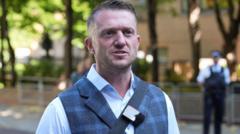What Are the 4 Surprising Facts You Don’t Know About Intersex Women?

Published: 2025-08-27 11:28:54 | Category: Health
Complete Androgen Insensitivity Syndrome (CAIS) is a condition that affects individuals with XY chromosomes, resulting in the development of female physical characteristics despite the absence of typical female reproductive organs. This article explores the lived experience of Jackie Blankenship, who has CAIS, shedding light on the condition and the misconceptions surrounding it.
Last updated: 04 October 2023 (BST)
Understanding Complete Androgen Insensitivity Syndrome (CAIS)
Complete Androgen Insensitivity Syndrome is a form of intersex variation that occurs when an individual with XY chromosomes (typically male) is unable to respond to androgens, the hormones that promote male characteristics. As a result, individuals with CAIS develop female external genitalia and secondary sexual characteristics. This condition highlights the complexities of gender and biological sex, challenging the traditional binary understanding of male and female.
Key Takeaways about CAIS
- CAIS affects genetic males with XY chromosomes who develop female characteristics.
- Individuals with CAIS often undergo significant medical and psychological challenges.
- Jackie Blankenship, a notable advocate for intersex awareness, shares her journey and experiences with CAIS.
- Misconceptions about sexual function and fertility in CAIS individuals are common.
- Understanding CAIS is crucial for reducing stigma and promoting inclusivity.
Jackie's Journey: From Diagnosis to Advocacy
Jackie Blankenship's journey began in Michigan, USA, where she was raised as a girl. At the age of four, her parents received a rare diagnosis—Jackie was genetically male with XY chromosomes due to CAIS. For most of her early childhood, Jackie exhibited no visible indicators of her condition, leading her parents to seek further testing only because of family history.
Despite having a supportive family, Jackie faced a tumultuous path to understanding her identity. “I looked like any other little girl,” she recalls. However, it was not until she was nine that she discovered the truth about her condition. At that time, her mother explained that she would not develop like her sisters. “I took it well, I think,” Jackie reflects, indicating a lack of understanding of the long-term implications of her diagnosis.
The Challenges of Growing Up with CAIS
As Jackie transitioned into adolescence, she began to notice the differences between herself and her peers. While her friends were preoccupied with the onset of menstruation, Jackie felt a sense of relief, as she would not experience this aspect of womanhood. However, this relief was coupled with the reality that she would need to undergo surgery at the age of 15 to remove her testes, which posed a risk of cancer if left untreated.
Jackie's surgery was a significant turning point. It was during this time that she learned more about her condition and the implications for her future. The NHS states that the removal of testes typically occurs after puberty because they produce hormones that aid in the development of a female body shape. In Jackie’s case, the procedure was essential for her health and safety.
The Physical Aspects of CAIS
One of the most notable aspects of CAIS is the lack of typical male characteristics due to the body’s inability to respond to testosterone. “I don’t grow any body hair or pubic hair,” Jackie explains, highlighting one of the many physical attributes influenced by her condition. This absence of secondary sexual characteristics can often lead to confusion or misunderstandings about gender identity and sexuality.
Sexual Function and Relationships
Jackie’s experience with sexual health has also been uniquely challenging. At the age of 18, she was informed that due to her anatomy—specifically a “blind pouch” instead of a fully formed vagina—she would need to undergo vaginal dilation therapy if she wished to engage in sexual intercourse. “I was born with a blind pouch—my vagina doesn’t have a cervix,” she explains, indicating the complexities of her anatomy.
Through a year of dilation therapy, Jackie faced significant emotional and psychological hurdles. “It was traumatic,” she recalls, as she grappled with societal expectations and pressures regarding sexual readiness and normalisation of her body for potential partners. Many people are unaware that individuals with CAIS can have fulfilling sexual relationships, albeit with some medical assistance.
Motherhood: A Dream Fulfilled
Despite the challenges associated with CAIS, Jackie has embraced motherhood. She is the proud mother of a nine-year-old daughter, Greenleigh. However, due to her condition, Jackie does not have ovaries or a uterus, rendering her infertile. This reality was a significant consideration for Jackie and her husband, Jim, when they decided to start a family.
Jackie learned at a young age that she would never be able to bear children. However, her sister, Danielle, offered to carry a baby for her and Jim. The couple underwent three rounds of IVF using an egg donor, ultimately leading to the birth of their daughter. “I went to all the appointments,” Jackie shares, expressing the joy of being involved in the process. “I went through a lot to be a mum… the road was not easy.”
Misconceptions and Education
Jackie's advocacy work on platforms like TikTok has been crucial in educating others about CAIS and intersex issues. She highlights the common misconceptions that surround her condition, including the idea that individuals with CAIS cannot have sexual relationships or that they are “deceiving” partners. “People don’t understand it,” Jackie says, emphasising the lack of education regarding the human body and variations beyond the binary understanding of male and female.
Jackie's candid discussions about her experiences are intended to demystify CAIS and promote understanding. She believes that sharing her story can help reduce stigma and encourage others to embrace their identities. “For the most part, people are very intrigued,” she notes, indicating a growing interest in learning about intersex conditions.
The Importance of Inclusivity and Understanding
As society progresses, there is an increasing need for inclusivity and understanding surrounding intersex individuals. Jackie’s story illustrates the importance of recognising the diverse experiences of people with conditions like CAIS. By raising awareness and challenging misconceptions, advocates like Jackie are paving the way for a more informed and accepting society.
Education about conditions such as CAIS is crucial for healthcare professionals, educators, and the general public. Understanding the nuances of intersex variations can foster an environment where individuals feel accepted and supported in their identities. As Jackie states, “We’re only told the black and white of male and female,” indicating a gap in knowledge that needs addressing.
Conclusion
Jackie Blankenship’s journey through life with CAIS exemplifies the complexities of gender identity, physical health, and societal expectations. Her advocacy work plays a vital role in educating others and promoting acceptance of intersex individuals. As more stories like Jackie’s come to light, the hope is that society will move towards a future where inclusivity and understanding are the norms, rather than the exceptions.
What can we do to promote awareness and acceptance of intersex individuals in our communities? Consider the importance of education and empathy in fostering a more inclusive society. #IntersexAwareness #CAIS #GenderDiversity
FAQs
What is Complete Androgen Insensitivity Syndrome (CAIS)?
CAIS is a condition where individuals with XY chromosomes develop female physical characteristics due to their bodies' inability to respond to testosterone. It results in the absence of male reproductive organs but typically presents with female external genitalia.
What are the typical symptoms of CAIS?
Individuals with CAIS may have female external genitalia, lack menstruation, and do not develop typical male secondary sexual characteristics. They may also require medical interventions for sexual function.
Can individuals with CAIS have children?
Most individuals with CAIS are infertile due to the absence of ovaries and a uterus. However, some may explore options like surrogacy or adoption to start a family.
How can society support intersex individuals?
Education and awareness are key. By understanding intersex conditions and advocating for inclusivity, society can create a supportive environment for intersex individuals to thrive.
What challenges do individuals with CAIS face?
Challenges include medical issues, psychological impacts of their condition, societal misconceptions, and pressures regarding gender identity and sexual relationships.



